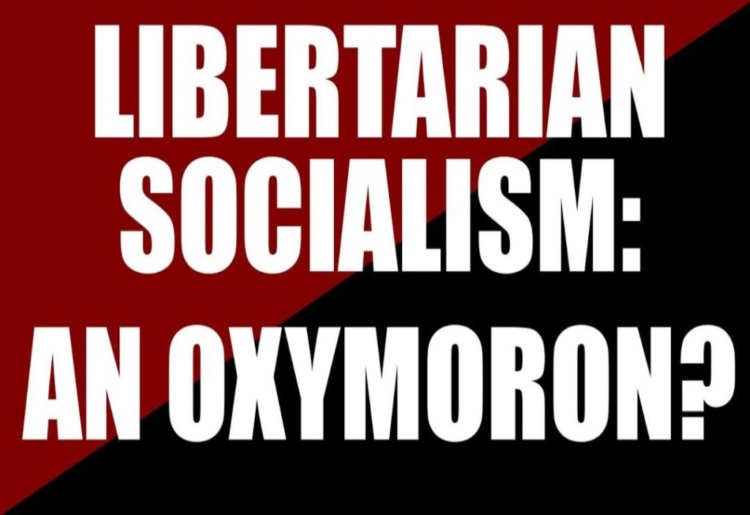Libertarian Socialism refers to a socioeconomic system that prioritizes freedom of thought and action and free will. It calls for producers to have greater control over the means of production and distribution along with increased political power.
Libertarian Socialists reject state control in its entirety and hold that it’s possible to establish a society that’s based on the ideals of justice and freedom by eliminating authoritarian institutions, which control the means of production & subordinate people to an economic or political elite. They believe in establishing decentralized structures that are based on principles like direct democracy & confederal or federal associations like workers’ councils, trade unions, libertarian municipalism, and citizens’ assemblies. This system believes in promoting voluntary and libertarian human relationships by identifying, criticizing, and dismantling illegitimate authoritarian institutions that control today’s society.
Libertarian Socialism premises on giving power directly to the people instead of concentrating said power into elected legislatures. While both models basically mean that the people control and own resources, libertarian socialism prefers direct democracy or local councils over legislatures. Libertarian Socialism is a term that covers a broad spectrum of ideas, all the way from workers’ councils, which were advocated by Libertarian Marxist Rosa Luxemberg, to anarchist movements in Revolutionary Catalonia or Free Territory, located in Ukraine. Mikhail Bakunin, Murray Bookchin, and Peter Kropotkin are all examples of prominent libertarian socialists.
Let’s take a look at various popular socioeconomic systems and how they differ from Libertarian Socialism:
Libertarian Socialism vs Democratic Socialism
Democratic Socialism holds that socialism can be established by setting up a democratically elected legislature. This government would then hand over its control of resources and the economy directly to the people, which they would then manage directly in coordination with this democratically elected government. Famous proponents of this system include politicians like Eugene Debs, Chilean President Allende, scientists like Einstein, and authors such as Howard Zinn.
Libertarian Socialism seeks to eliminate legislatures completely whereas Democratic Socialism retains a limited form of government in power. Both of them have very slight differences, but by and large, they share similar characteristics. Both ideologies are very different from Marxist-Leninist teachings, which have been widely implemented throughout the world. Capitalists and Marxist-Leninists do not consider Libertarian and Democratic Socialists to be valid forms of socialism. Marxist-Leninists have also often led oppressive measures against them.
Libertarian Socialism vs Social Democracy
Social Democracy refers to a socioeconomic and political ideology that favors social and economic interventions for promoting social justice principles within a capitalist-oriented economy and liberal democratic polity. The norms and protocols that are used for accomplishing this require a commitment to participatory and representative democracy, measures to promote income redistribution, regulatory economic measures that are in public interest along with provisions for social welfare. Because of their implementation by social-democratic political parties that have been in power for a long time in several Nordic countries, social democracy has become synonymous with Keynesianism and the Nordic economic models within political and economic circles.
Social democracy still retains capitalist markets, which are an absolute no-no for libertarian socialists. While social democracy prioritizes the welfare of the people above all and is not opposed to the use of capitalism to achieve these objectives, libertarian socialism prioritizes power to the people above all and is completely opposed to the concentration of power and resources in the hands of the capitalists on all fronts. The use of money is also widely prevalent in social democracies, which is a feature that libertarian socialists seek to eliminate in their societies. By providing complete control to the people over the means of production, the system is expected to balance supply and demand on its own, thus enabling a cashless society.
Libertarian Socialism vs Authoritarian Socialism
Authoritarian socialism refers to a political and economic system that supports certain socialist economic features while rejecting any political liberalism. It can be defined as a set of complex socioeconomic political systems that call themselves socialist and reject liberal democratic principles like the freedom of expression, habeas corpus, freedom of assembly, multi-party politics and others, out of fear that it could trigger its own end or a counter-revolution. Several countries, including China, the erstwhile Soviet Union, and its allies have often been considered to be authoritarian socialist countries by scholars and journalists.
Libertarian socialism and authoritarian socialism are polar opposites. People who support the latter are often strong supporters of socialist economic systems that prioritize public ownership above all but also a reliable, strong government. However, it should not be mistaken to be support for a dictatorship, since this support is mostly only for a form of government that is both accountable and strong. A few democratic socialists, social democrats, Stalinists & Marxist-Leninists are strong supporters of authoritarian socialism. Libertarian socialism on the other hand, is dead against any form of government and calls for direct control by the people.
Libertarian Socialism vs The Communist State
Also called the Marxist-Leninist state or the Communist State, this state is governed and administered by one single party based on Marxist-Leninist ideals. This was the official state ideology of communist countries in the Warsaw Pact, the Eastern Bloc & the Comecon, of Comintern post-Bolshevization, and the erstwhile Soviet Union. It continues to influence the state ideologies of many communist countries throughout the world and is the official party ideology of various parties that rule Vietnam, Laos, Cuba, and China.
Communist countries are usually administered by a centralized party apparatus, which is not allowed under libertarian socialism. While some countries do allow multiple political organizations and parties to operate, they are still operated by the same centralized party. Such parties always follow either Marxist-Leninist teachings or some variation of the same like Titoism and Maoism. The official objective is to achieve socialism and progress towards a fully communist country. In many cases, communist countries have also enabled other non-party worker organizations like trade unions, direct democratic participation, and factory committees to participate in the political processes of the country.
While communism and libertarian socialism are at opposite ends of the spectrum when it comes to government formation and power, they still seek to move towards forming an utopian, moneyless society. Social welfare ranks as the top priority for both political models, as well. However, other important aspects like individual freedom are severely curtailed in the communist state.


